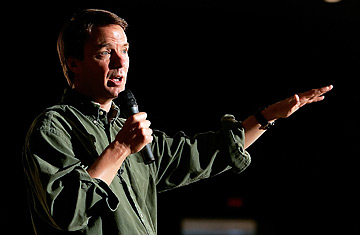
Democratic presidential hopeful and former North Carolina Senator John Edwards answers a question during a town hall meeting at the Iowa Memorial Union on the campus of the University of Iowa in Iowa City, January 20, 2007.
Last month, after Edwards gave a fiery speech calling on Democrats in the Senate to stop the President from increasing the number of troops in Iraq, Chris Dodd, Barack Obama and Hillary Clinton, three of his 2008 rivals, all introduced bills to do just that. Seemingly every week Clinton moves closer to a position Edwards took in November 2005, when he wrote an op-ed for the Washington Post entitled "I was wrong" for voting for the war. Clinton says the country would not have gone to war with Iraq if she had been president. And Edwards is the first one to come out with a detailed universal health-care plan, which all the candidates will be pressured to do as well.
Edwards's strategy is working for him so far. Obama was once the hero of the liberal blog world, but a poll of more than 20,000 readers on Daily Kos this week showed Edwards and he in a virtual dead-heat, with Edwards leading 26% to 25%. (As Dean learned, wooing the Netroots is complicated; Edwards is also in a controversy over some bloggers he hired.) The crowd at the Democratic National Committee winter meetings clapped continuously during Edwards's speech there, as he repeated his calls for his party to show "courage" in opposing the war. Labor leaders are very enthusiastic about his emphasis on reducing poverty and increasing the minimum wage. And he has strong poll numbers, coming either first or second in most surveys in Iowa.
To be sure, Edwards is a much different candidate than Dean. He's far more disciplined in terms of sticking to his campaign themes, to the point of repeating word-for-word answers he gives from city to city and interview to interview, and he already has the experience of a presidential run. But he's trying to establish himself as the bold, straight-talking candidate, as Dean did in 2003. Edwards has said from the beginning of his campaign "it's make believe" that a president could balance the budget, create universal health care and reduce the problems of global warming and poverty. So he's focused on the latter goals, rather than what one of his advisers called a "theoretical" issue: shrinking the deficit.
The health plan requires employers either to provide insurance or pay a tax of up to 6% of each employee's salary that would go to a government fund that provides coverage. It's the kind of mandate business groups strongly opposed when the Clintons sought to require employers to provide insurance as part of their health plan in the 1990s, and Edwards's plan would likely generate similar opposition if he were elected.
Edwards's ideas are likely to resonate in a Democratic primary, but they may not add up to many more voters. As Dean found in 2003 when the other contenders, including Edwards, started to adopt his strong anti-war rhetoric and his loud opposition to the No Child Left Behind education law, ideas resonating with the voters will be copied by the other candidates. Edwards may have arrived at his war opposition before most of the contenders, but it won't matter if they all have the similar positions on the war by January 2008 — and all the candidates are already heading toward calling for some measure of troop withdrawal over the next two years.
Even as her husband was at the House Democrats retreat last weekend encouraging them to take incremental steps on policy, such as trying to reduce administrative costs in health care, Hillary Clinton was telling Democrats at the DNC event that the party should overcome "a sense of fatalism" and do bold things, as Edwards has been saying. And Edwards won't be rewarded for taking some honest stands. Told about Edwards's comments on the impossibility of balancing the budget and creating universal health care, Al From, who runs the centrist Democratic Leader Council, called it "a false choice," and suggested a president could do both.
But voters are a long way from reading each candidate's health-care plan. So Edwards will spend much of the month of February attending fundraisers all over the country, trying to persuade big-money donors that while he may have a Dean-like message, he is capable of doing something the ex-Vermont governor couldn't: win.
